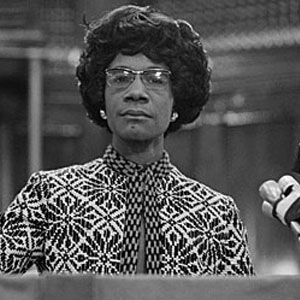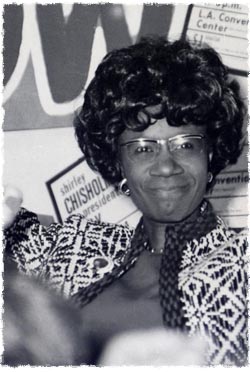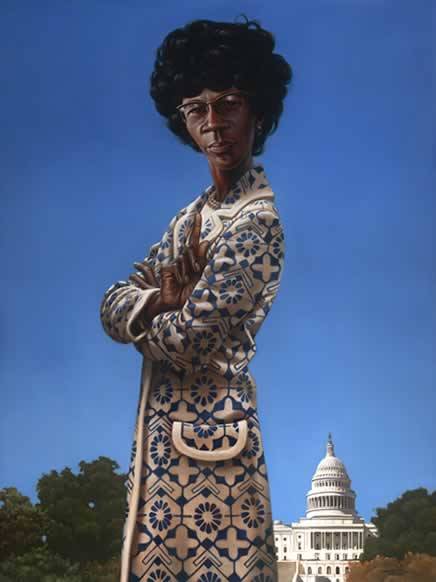Black Herstory: The Founders of the Feminist Party
It never ceases to amaze me how many students in my women’s studies classes have never heard the names Flo Kennedy, Pauli Murray and Shirley Chisholm (left), all black women. Yet they “might have heard” of Betty Friedan, author of The Feminine Mystique and a white woman, thus suggesting that black feminists have been written out of feminist history.
Friedan was one of the founders of NOW (the National Organization for Women), but so were Kennedy, Murray and Chisholm. In addition, Pauli Murray became the first black woman Episcopal priest, Shirley Chisholm the first black woman member of Congress, and Florynce (Flo) Kennedy the second black woman admitted to Columbia Law School (thus kicking off a lively and fearless career as a civil rights attorney, political activist and radical feminist). Nonetheless, their own feminist histories are in danger of getting erased.
Consider this: Back in 1971, Flo Kennedy had the temerity to found The Feminist Party as an actual political party–you know, daring to envision feminism as a “political movement” and not simply as an “academic exercise” or “alternative lifestyle choice.” From that radical platform the next year, Shirley Chisholm was launched as a candidate for president of the United States–the first woman to run for the Democratic presidential nomination and the first major-party black candidate for president. Women like Chisholm, Kennedy and Murray were “unbought and unbossed”–as Chisholm titled her autobiography, and they laid the groundwork for modeling feminism that simultaneously tackled sexism, racism, classism and heterosexism.
The existence of these women should be enough to shut down all conversations that question whether or not black feminism is only a response to white women’s racism. Where would the women’s liberation movement be had it not included Flo Kennedy? In addition to launching Chisholm as a presidential candidate, she fought for the legalization of abortion and wrote Abortion Rap. She toured with Gloria Steinem in promoting the feminist movement and, when asked by men in audiences if the two of them were lesbians, famously responded, “Are you my alternative?”
In fact, Flo was notorious for her one-liners. About marriage: “Why would you lock yourself in the bathroom just because you have to go three times a day?”About women needing men: “A woman without a man is like a fish without a bicycle” (often attributed to Steinem). On abortion: “If men could get pregnant, abortion would be a sacrament.” On freedom struggles: “It’s like taking a bath–you’ve got to do it every day.”
So why don’t my students know these women–real Founding Mothers (if ever there was such a term) of one of the most vibrant mass women’s movement in U.S. history–until they take my class? And why do I constantly encounter women of color, in particular, who treat “feminism” with suspicion, as if it were some exclusive “white women’s only club” to which they must be given an “invitation”? Black women were the ones who helped create the “club” in the first place!
Perhaps this is due to a new generation of feminists who read about the grievances feminists of color had with their white counterparts in the works of bell hooks, Audre Lorde, Cherrie Moraga, and Gloria Anzaldua and their groundbreaking texts such as as Feminist Theory: From Margin to Center, Sister Outsider and This Bridge Called My Back. Since these narratives are often presented in women’s studies courses as the sole experience of feminists of color, we tend to overlook the part black feminist founders also played in shaping the women’s movement–and not just “from the margins.”
And the 1970s wasn’t the first time we black women have helped to lay feminist foundations. Before the “first wave” of the women’s movement, Maria Stewart (1803-1879) became the first woman in U.S. history, in 1831, to speak in public about women’s rights, drawing on ideals of black liberation in the Haitian Revolution and other slave uprisings. It wasn’t until more than five years later that white women abolitionists Sarah and Angelina Grimke dared speak in public–and were just as loudly criticized by their male counterparts as was Stewart. It was gender discrimination in the anti-slavery movement that actually prompted the formation of a women’s movement, which later shifted its attention to woman suffrage (because so many white women were angered that black men got the right to vote before they did!).
There is nothing to gain in this erasure of women of color from feminist history. As Audre Lorde, another “Founding Mother,” warns, “When patriarchy dismisses us, it encourages our murderers. When [feminism] dismisses us, it encourages its own demise.” The history reveals that no woman of color should ever feel excluded from feminist organizing or have to enter through the back door–not when we built the house and created the home!
The history of the U.S. feminist movement tells us instead that interracial solidarity must exist if we are to collectively and successfully fight against intersectional oppressions.We black women are the feminist movement. We are the bodies on which feminist theories are created–from enslaved women and domestic workers (who had to expose sexual harassment on the job), to Rosa Parks and other black women living in the Jim Crow South (who protested sexual violence as an institution of terrorism), to Fannie Lou Hamer (who exposed the abuses of the state against black women’s reproductive rights), to Loretta Ross (who helped direct the first rape crisis center in the U.S). We are the case study for why “life sucks for women.” It’s because of the combined effects of different “isms” that we’ve had to speak out in the fight for women’s rights. And it’s because women of color “bleed at the intersections,” as Gloria Anzaldua noted, that we need a feminist movement–and why white women and our other various allies will not advance toward any future liberation without our involvement.
It would help if more of us were aware how very central black women have been to feminism from its inception. Let us work toward integrating the experiences of women of color from different eras and different political spectrums as we improve both the women’s studies and American history curricula. That way, each new generation of feminists won’t have to reinvent the wheel as they engage in productive intergenerational conversations in the continued struggle for social justice and feminist liberation.
http://msmagazine.com/blog/2012/02/09/black-herstory-the-founders-of-the-feminist-party/




 You beat me...
You beat me...






